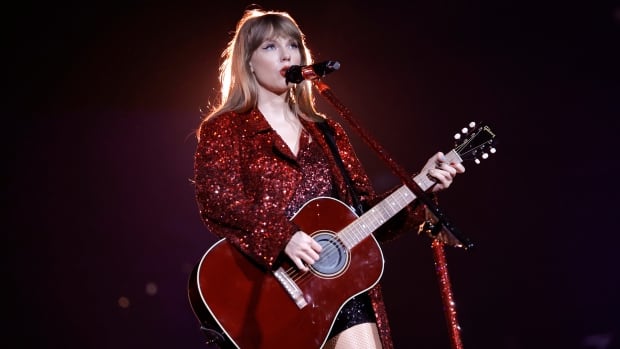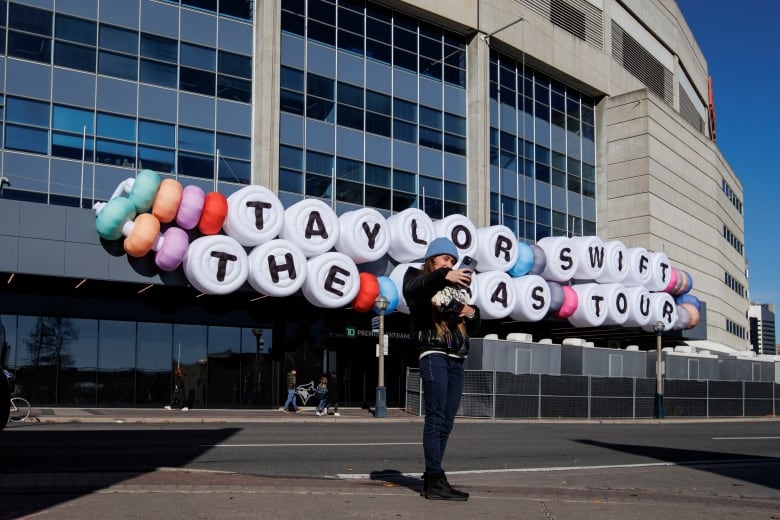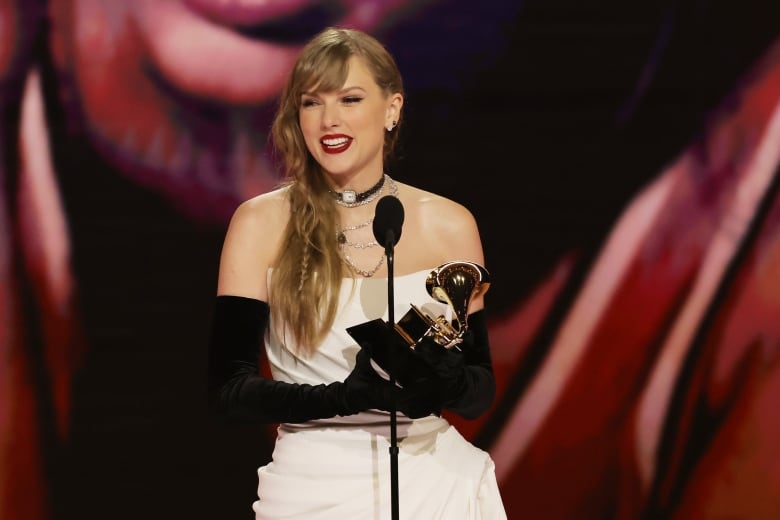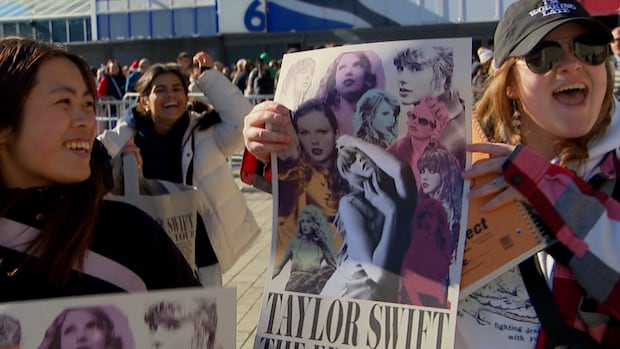
To some of her fans, she’s more than a pop star: Taylor Swift is a historical figure.
The singer-songwriter has earned all the titles of typical stardom: from America’s Sweetheart, to the Princess of Country to even the new Queen of Pop. But she’s also cultivated a level of fame that many pop culture experts thought was impossible in the modern age of fragmented, self-guided media consumption.
“She really kind of blew up the music industry a little bit,” fan Samantha Gallant told CBC at a Taylor Swift dance party in Halifax, referring to Swift reclaiming her masters.
“She’s telling other artists that they can kind of do the same thing: that they don’t have to let something that they put their whole life into just sit in somebody else’s hands.”

And to others, it’s something even greater than that. Taylor Swift isn’t just a pop superstar, she’s the leader of a cultural movement. It’s an observation made by everyone from Prime Minister Justin Trudeau — who once pleaded with the celeb to visit the country — to Ringo Starr, who compared “Swiftmania” to Beatlemania of the 1960s.
Municipalities have also bowed to her will, grateful for the financial bump her shows bring. Her upcoming Toronto leg is projected to bring $282 million to the local economy over her six-day mini residency.
And ahead of her first shows there this week, fans in Canada’s largest city only seem to be standing firmer in that opinion: The “Taylor effect” — Swift’s commanding impact on the music industry and culture at large — is a defining element of the 21st century.
But how much exactly has Swift actually changed anything? What exactly is behind the Taylor effect, and how did it get so big?
Tens of thousands of Taylor Swift fans are expected to spend a lot of cash throughout six concerts in Toronto. Tourism and hospitality businesses could see an economic boost of almost $300 million.
Understanding a fan base
In her two decades in the industry, Swift’s impact in numbers is clear: According to the New York Times, she’s outsold Britney Spears in albums, and, when including her Taylor’s Version rerecordings, Michael Jackson. By the end of 2023, her Eras Tour became the first to gross over a billion dollars US.
To Richard Trapunski, national editor of Billboard Canada, the reason for her generational popularity, at least, is self-explanatory. Starting from her debut album released in 2006, Swift has cultivated a mythos behind her lyrics. Everything — from her songwriting to her album rollouts to her outfits — seems, by fans, to be infused with secret meaning.
Swift herself has knowingly played into that, Trapunski said, additionally by controlling the narrative of her own career. He pointed to her infamous fight to reclaim her masters, where she has been rerecording and releasing her old songs, after star manager Scooter Braun — a noted nemesis of Swift’s — bought her former label, Big Machine Records, in 2019.

There is also her long-ranging career, full of transformations: having started out as a young teen country-pop star, she reinvented herself through personal styles and designated “eras.”
And now she has used that power to orchestrate the Eras Tour: a show dedicated not just to promoting a recent album, but also to show off the breadth of her career. That can be emboldening to her fans, Trapunski said.
- CBC Radio’s Just Asking wants to know: What questions do you want explained about the Taylor Swift phenomenon? Fill out the details on this form and send us your questions ahead of the next episode on Nov. 17.
By balancing a mysterious nature with the projection of a woman in charge of her own destiny, he said, she has created an almost irresistible media brand.
“There are very few artists who understand their fan base as well as Taylor Swift does,” he said.
“She really understands, I think, what her fans want and how to deliver it to them — and to do it in a way that is going to guarantee you No. 1 on the charts for pretty much anything.”

At the same time, her career longevity has only worked to increase the mania around her. For Toronto-based music journalist Melissa Vincent, now that her peers are now having kids of their own, Swift’s continued popularity means they have even more of a reason to share her music.
“You’re now getting into, like, generational experiences with fans who … are now getting to the age where they might be introducing some of their own daughters to her music,” she said. “Or playing her music for their babies in utero.”
“Taylor Swift is something that reaches across ages,” said Geena Kelly, a fan in Halifax. “I’m 33 now, and I remember being in high school singing along to her debut album in my late 20s.
“She’s been there throughout all of it.”
The ‘beautiful mystery of her’
Swift’s methods in maintaining her spot at the top for this long have brought some criticism. Culture writer Niko Stratis said she done so by using her influence sparingly in politics.
“We have seen her find her voice, lose her voice, selectively mute herself, and then figure out where she wants to insert herself into a certain set of political conversations,” Stratis said.
That’s not to say Swift never speaks out: The star endorsed U.S. presidential candidate Kamala Harris earlier this year. But that came expectedly late for the singer, said Stratis, as her fame hinges on her ability to mean many things to many people, only elaborating on some of her political beliefs in 2019.
“She’s a bit of a whiteboard in that regard,” she said. “Like she will endorse people, but only at the 11th hour. She will never speak up too much because that’s not part of the, like, beautiful mystery of her.”
Ongoing influence
And to burgeoning stars coming up now, that influence is as strong as ever.
“One hundred per cent,” Calgary pop singer Devon Cole said, of the singer’s impact. “Taylor Swift walked so we could run — [so] burgeoning feminist writers could run.”

While Cole credits many of Swift’s skills as guiding lights for her own career, she says her most impressive accomplishment is beyond politics, marketing or fandom. It’s her unique ability among modern artists to write songs that express something to which everyone can relate.
“She is the queen of taking a very nuanced experience to her or something really personal to her and painting it in such a beautiful way that it’s universal,” she said.
“And I try to do that. I don’t think I’m the only songwriter in the world who looks up to her so much — I mean, she’s just, she’s a poet.”


